Semester Grammar highlights
| Ser--to be | |||
|---|---|---|---|
| yo | soy | nosotros/as | somos |
| tú | eres | vosotros/as | sois |
| Ud. | es | Uds. | son |
| él, ella | es | ellos, ellas | son |

How do we express negative notions in Spanish?
- Yo NO llevo falda ⇒ ”No” precedes the verb.
- No tengo ninguna falda ⇒ Double negations are ok in Spanish!
- ¿Te gustan las faldas?
- No, no me gustan las faldas ⇒ We may repeat “no” when stating "No, X don’t/ doesn’t …”
- ¿Te gustan las faldas? - No, prefiero los vestidos ⇒ if we answer by giving extra information, there is no need to repeat the question.
- If you want to say "not" it is still no and still goes BEFORE the verb.
- I am not mean. No soy antipático.
- It is not good. No es bueno.
Es no bueno.is not Spanish.
El verbo "tener"--to have
| yo | tengo | nosotros/nosotras | tenemos |
| tú | tienes | vosotros/vosotras | tenéis |
| Ud. | tiene | Uds. | tienen |
| él, ella | tiene | ellos, ellas | tienen |
There are some common expressions that use “tener”:
| Expresiones con “tener” | |
|---|---|
| Tener que + infinitivo | to have to + infinitive |
| Tener hambre | to be hungry |
| Tener sed | to be thirsty |
| Tener frío | to be cold |
| Tener calor | to be hot (individual temperature) |
| Tener sueño | to be sleepy |
| Tener miedo | to be scared |
| Tener razón | to be right/ correct |
| Tener ganas | to feel like/have the urge to |
| Tener suerte | to be lucky |
| Tener prisa | to be in a hurry |
| Tener X años | to be X years old |
| Estar | |
|---|---|
| yo | estoy |
| tú | estás |
| usted/él/ella | está |
| nosotros/nosotras | estamos |
| vosotros/vosotras | estáis |
| ustedes/ellos/ellas | están |
| Jugar | Ir | |
|---|---|---|
| Yo | Juego | Voy |
| Tú | Juegas | Vas |
| Él/ Ella/ Usted | Juega | Va |
| Nosotros/ Nosotras | Jugamos | Vamos |
| Vosotros/ Vosotras | Jugáis | Vais |
| Ellos/ Ellas/ Ustedes | Juegan | Van |
El verbo "gustar"--to like

Regular verbs

Demostrativos
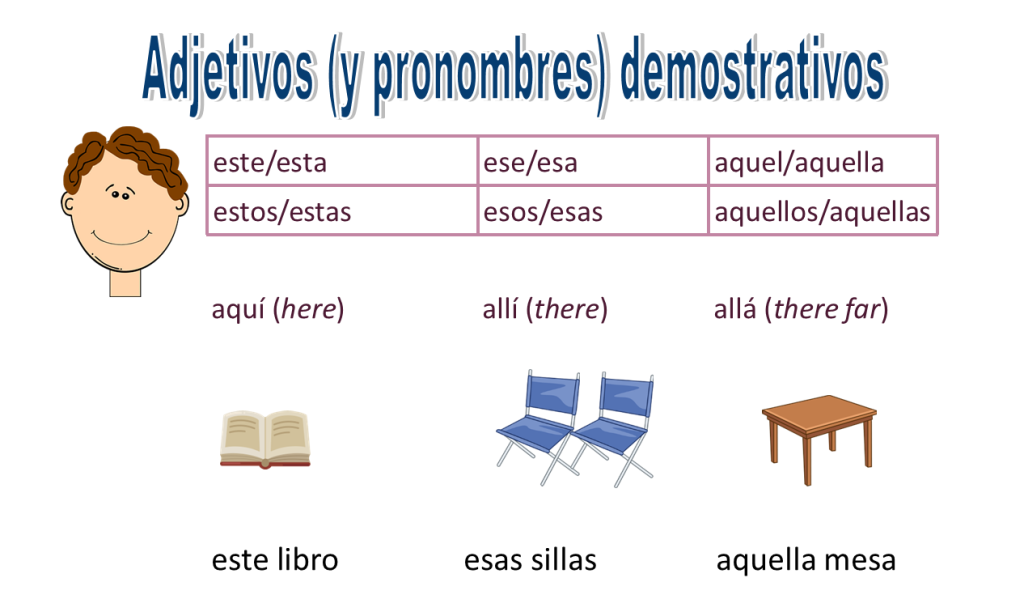
You've seen that tener has an irregular yo form→tengo. Here are some other common verbs that also have an irregular yo form. *Note that decir and oír have other irregularities as well.
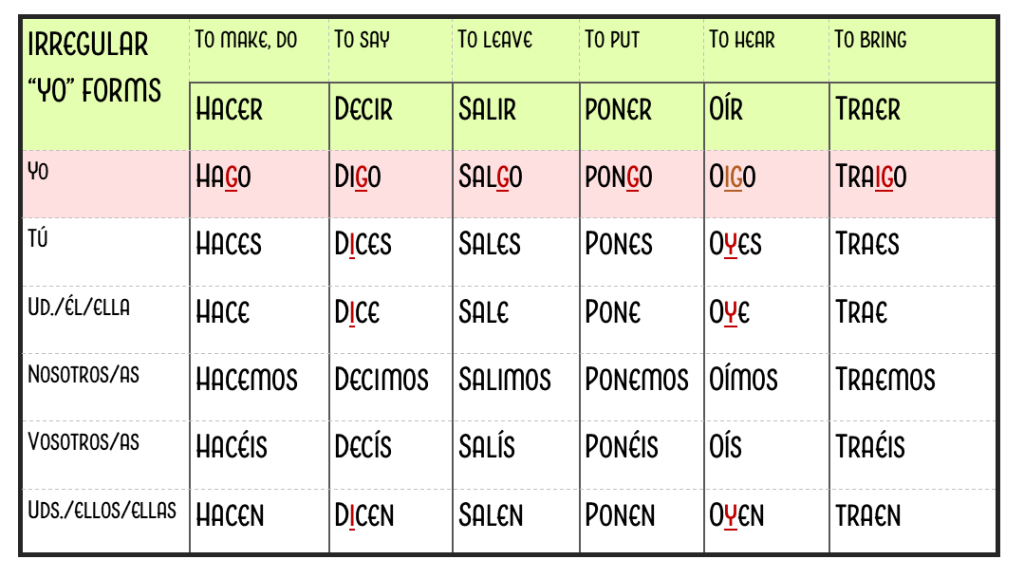
Posesivos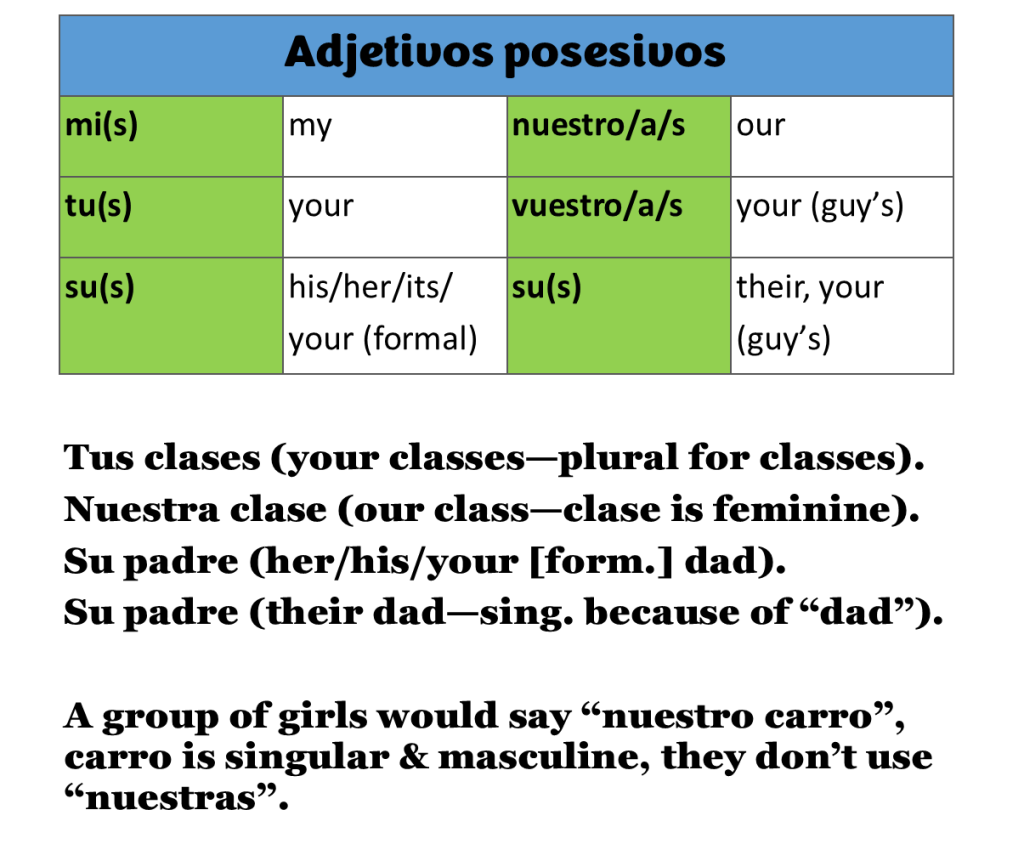
| Preferir + infinitivo | Querer + infinitivo | |
|---|---|---|
| Yo | prefiero escuchar música | quiero ir a un concierto |
| tú | prefieres bailar | quieres ir a una discoteca |
| él/ ella/ usted | prefiere cocinar en casa | quiere comer en un restaurante |
| nosotros/ nosotras | preferimos beber agua | queremos beber refrescos |
| vosotros/ vosotras | preferís hablar en inglés | queréis hablar en español |
| ellos/ ellas/ ustedes | prefieren leer en sus tabletas | quieren leer en papel |
- ¿Cuándo? When?
- ¿Dónde? Where?
- ¿Qué? What?
- ¿Por qué? Why?
- ¿Quién(es)? Who?
- ¿Cómo? How?
- ¿Cuánto/a/s? How much? How many?
- ¿Cuál(es)? Which? What?
- ¿De quién? Whose?
What do they all have in common? All have accents when used as a question or implied question.
Hacer planes: "pensar, tener ganas de, ir a + infinitivo"
Tener ganas de hacer algo = to feel like doing something
Pensar hacer algo = to plan to do something.
Ir a hacer algo = to be going to do something.
Verbos reflexivos
| Pronombre | Verbo |
|---|---|
| Me | levanto |
| Te | levantas |
| Se | levanta |
| Nos | levantamos |
| Os | levantáis |
| Se | levantan |
Stem-changing verbs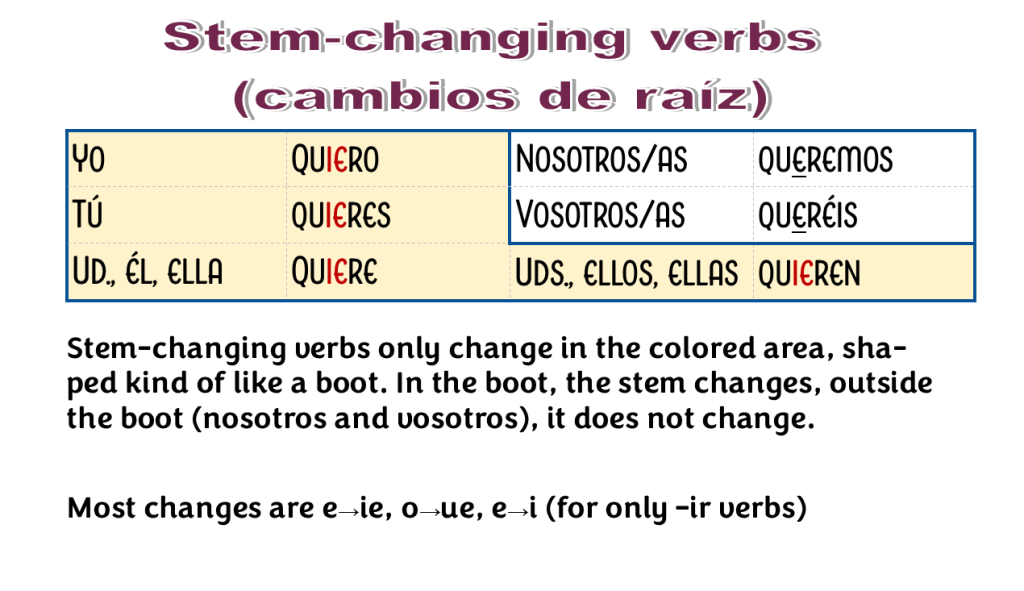
Verbos irregulares--con cambios de raíz
| cambios | (e→ie) (e→i) (o→ue) |
|---|---|
| pensar (e→ie) | to think |
| contar (o→ue) | to count, tell |
| sentir (e→ie) | to feel |
| dormir (o→ue) | to sleep |
| pedir (e→i) | to ask for |
| despertarse (e→ie) | to wake up |
| acostarse (o→ue) | to go to bed, lie down |
| querer (e→ie) | to want, love |
| poder (o→ue) | to be able to (can) |
| mentir (e→ie) | to lie |
| morir (o→ue) | to die |
| seguir (e→i) | to continue, follow |
| cerrar (e→ie) | to close |
| acordarse (o→ue) | to remember |
| entender (e→ie) | to understand |
| volver (o→ue) | to return |
| divertirse (e→ie) | to have fun |
| vestirse (e→i) | to get dressed |
| empezar (e→ie) | to start, begin |
| recordar (o→ue) | to remember, remind |
| encender (e→ie) | to turn on (electric item) |
| soler (o→ue) | to usually do something |
| preferir (e→ie) | to prefer |
| reírse (e→i) | to laugh |
| sonar (o→ue) | to sound, make a sound |
| soñar (o→ue) | to dream |
| doler (o→ue) | to hurt (acts like "gustar") |
| elegir (e→i) | to choose |
| costar (o→ue) | to cost |
| conseguir (e→i) | to get, obtain |
| medir (e→i) | to measure |
| jugar (u→ue) | to play |
| fregar (e→ie) | to scrub, wash |
Pronombres de objetos directos
| singular | plural |
|---|---|
| me | nos |
| te | os |
| lo/la | los/las |
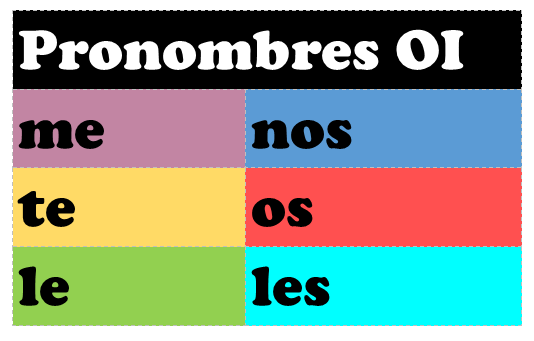
El presente progresivo
Para formar el gerundio (-ing form):
verbos regulares -ar→-ando→hablando
verbos regulares -er, -ir→iendo→comiendo, viviendo

There are a number of irregular gerunds (gerundios). Irregular -ir verbs will have a change as will some others.
dormir→durmiendo
leer→leyendo *any -eer -oir -uir verb does the same
construir→construyendo
morir→muriendo
pedir→pidiendo
sentir→sintiendo, etc.
Saber/ Poder + infinitivo/ Habilidades
- SABER = TO KNOW
- Sé dónde vive mi familia.
- SABER + INFINITIVE = TO KNOW HOW TO DO SOMETHING
- Sé cocinar pozole.
- PODER + INFINITIVE = CAN/BE ABLE TO
- Puedo escribir con la mano izquierda.
¿Sabes cómo conjugar estos verbos?
| Saber | Poder | ||
|---|---|---|---|
| Yo sé | Nosotros/as sabemos | Yo puedo | Nosotros/as podemos |
| Tú sabes | Vosotros/as sabéis | Tú puedes | Vosotros/as podéis |
| Él/ Ella/ Ud. sabe | Ellos/Ellas/Uds. saben | Él/ Ella/Ud. puede | Ellos/Ellas/Uds. pueden |
Expresar obligación: " tener que, deber, necesitar, hay que, es necesario..."
- tener que + infinitivo = to have to
- deber + infinitivo = should, ought to
- necesitar + infinitivo = to need to
- Tengo que estudiar/ debo estudiar/ necesito estudiar
- hay que + infinitivo =one must
- es necesario + infinitivo = it is necessary to

| Saber | Conocer | ||
|---|---|---|---|
| Yo sé | Nosotros/as sabemos | Yo conozco | Nosotros/as conocemos |
| Tú sabes | Vosotros/as sabéis | Tú conoces | Vosotros/as conocéis |
| Él/Ella/Ud. sabe | Ellos/Ellas/Uds. saben | Él/Ella/Ud. conoce | Ellos/Ellas/Uds. conocen |
SABER = To know (facts or information or how to do something)
- Sabemos la receta para las enchiladas.
- ¿Sabes dónde hay un banco?
- Sé hablar español
CONOCER = To know (people or places)
- No conozco a la reina de España (don't forget the personal "a" for people)
- Conozco San Diego
COMPARATIVES OF INEQUALITY
- más/ menos + adjective/noun + que = more/ less + adjective/noun + than
- Fred es más alto que Ted
- Ted tiene más años que Fred
- verb + más/ menos que (to compare actions)
- Fred corre más que Ted
- Irregular comparatives:
- bueno ⇒ mejor
- malo ⇒ peor
- joven ⇒ menor
- viejo ⇒ mayor
You can negate the comparison to make it one of equality! No soy más alto que él. I am not taller than him.
SUPERLATIVE
Superlative = the most/ the least something
- el/la/los/las más - mi hija es la más habladora de su clase.
- el/la/los/las menos - mi abrigo es el menos caro de todos.
Superlativo absoluto
- -ísimo/a/s - Cuando estoy en casa, estoy contentísima.
- ¡Cuidado! largo→larguísimo; rico→riquísimo; feliz→felicísimo
- tan + adjetivo + como
- Antonella es tan inteligente como Camila.
- tanto/a/os/as + sustantivo + como (concuerda en género y número con el sustantivo)
- Tiene tantos amigos como nosotros.
- verbo + tanto como
- Rodrigo estudia tanto como Jorge.
Ser/Articles/Negaciones/Tener y expresiones/Estar/Jugar-Ir/Gustar/La hora/Regular verbs/Demostrativos/"Yo" irregulares/Posesivos/Preferir-Querer/Question words/Hacer planes/Verbos reflexivos/Stem-changing/Direct-indirect pron./Presente progresivo/Saber-Poder/Obligaciones/Ser y estar/Saber-Conocer/Comparaciones

